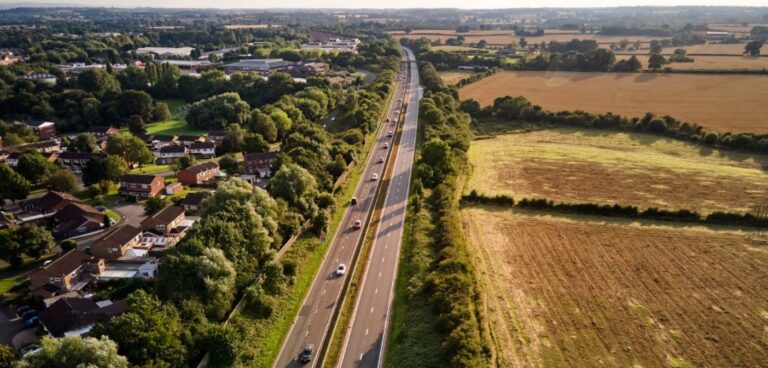National Highways has worked to cut the carbon footprint of its resurfacing work on a stretch of dual carriageway in the West Midlands – by recycling more than half of the materials from the old road.
Some 17,432 tons of material were reused from layers of road surface and saved from landfill, reducing the carbon footprint by 23%. The contractors added the work also helped to make the A46 Warwick Bypass smoother and safer for drivers.
Kier led the project on behalf of National Highways and recruited Aggregate Industries (AI) to carry out the resurfacing on 3.5 miles of the northbound carriageway between Sherbourne roundabout and the Leek Wootton roundabout.
Much of the material in the lower levels of the road contained tar which is classed as carcinogenic, therefore must be dealt with as hazardous waste and disposed of at a licensed waste processing facility.
But tar-bound material can be safely recycled and encapsulated back into the pavement layers by processing and re-mixing it.
Kier and AI devised a low carbon pavement solution for the resurfacing project and discovered the greenest and most cost-effective way to do this was by recycling the existing carriageway material and reducing the amount that would have to go to landfill.
The old layers of road were recycled back into the new carriageway using AI’s ex situ cold recycled Foamix asphalt. Foamix is a fully cold process and can be laid and compacted at a much safer ambient temperature which reduces the asphalt fumes on site which workers are exposed to.
Additionally, the material was mixed on site to minimise vehicle movements and reduce the scheme’s carbon footprint. Using recycled material meant there was less raw material needed for the works too and without the trips to the waste site as well, around 82,000 road miles were saved on this scheme.
Some 56% of materials were recycled from the old road into the new one. Any remaining material not used in this scheme, which ran between late July and September, was recycled back across the road network through other projects.
National Highways project manager, Ryan Davies, said: “We have committed, through our net zero carbon plan, to rapidly cut carbon from road construction, maintenance and operations, and support the transition to zero emission vehicles.
“A vital part of meeting our ambitious objectives is having the support of our supply chain on schemes such as this. Through close collaboration with partners such as Kier and AI we are taking great strides on our journey to net zero carbon.”
National Highways added it has already started sustained action towards decarbonising England’s motorways and A-roads so it can continue to bring benefits to motorists, communities and businesses in a net-zero future.





